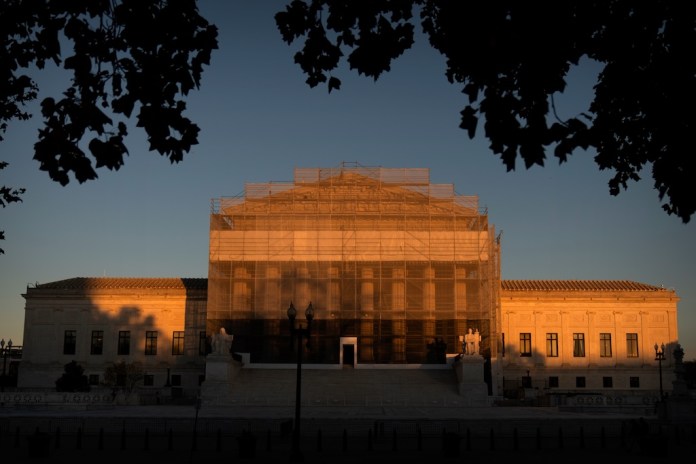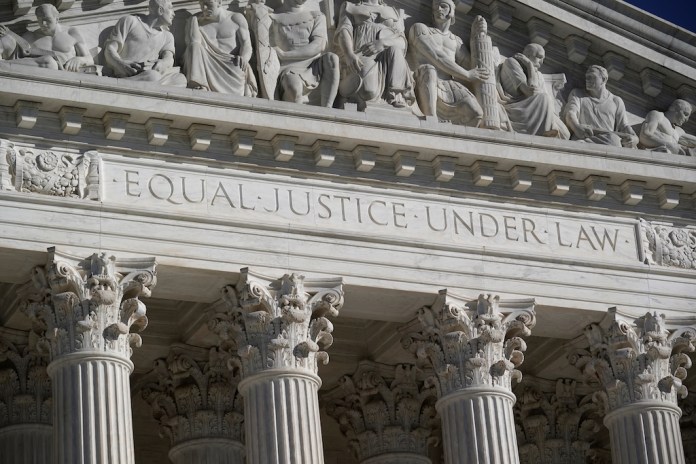Supreme Court’s Title IX ruling creates enforcement patchwork – Washington Examiner
The Supreme Court has recently ruled against the Biden administration’s updated Title IX regulations in 26 states, leading to an inconsistent application of these controversial legal changes in schools as students return from summer break. The ruling allows schools in those states to continue under the previous Title IX guidelines, while 24 Democratic-led states implement the new rules, which include recognizing transgender identities. Legal experts have criticized the decision, describing it as creating a “huge mess.” The ruling stems from lawsuits filed by Republican-led states, arguing that the new rules undermine women’s and girls’ rights by allowing biologically male students access to female-designated spaces and sports.
The Supreme Court’s 5-4 decision upheld lower court rulings blocking the rules, with a notable dissent from Justice Neil Gorsuch, who argued for the partial implementation of the regulations. As litigation continues, it remains uncertain if the Supreme Court will reassess the matter in the future. Meanwhile, advocacy groups have responded positively to the ruling, viewing it as a significant victory against the Biden administration’s gender policies in education.
Supreme Court’s Title IX ruling creates enforcement patchwork
The Supreme Court stalled the Biden administration’s updated Title IX rules in 26 states, creating an uneven patchwork of application of the controversial regulatory overhaul in schools as students across the country return from summer break.
The impact of the Supreme Court’s decision on Friday is already being felt in schools nationwide. In the 26 states where the new rules are blocked, schools are operating under the old Title IX guidelines, meaning 24 Democratic-led states, including Illinois, Pennsylvania, and New York, are operating under the new rules.
The Biden administration redefined sex under Title IX to include claimed transgender identities.
Steve Vladeck, a law professor at Georgetown University, described the Supreme Court’s decision as a “huge mess” that raises more questions than it answers.
“Friday’s ruling provides yet another object lesson in how poorly the justices have fared when grappling with complicated legal questions in the truncated context of emergency litigation,” Vladeck wrote on his blog, One First. He pointed out that the blocked rules include provisions unrelated to gender identity, such as protections for pregnant and postpartum students, which are now also on hold.
From a culture war lens, opposition to the Biden administration’s rule changes has been fierce, particularly in Republican-led states that brought lawsuits such as Kansas, Texas, Florida, and Ohio.
Multiple Republican state attorneys general have argued that the new rules would undermine the rights of women and girls by allowing biologically male students to participate in female-only sports and use facilities designated for females such as locker rooms and bathrooms. In response, 26 states filed lawsuits to block the implementation of the new Title IX guidelines, leading to a series of legal battles in lower courts and halts on the rule in more than 3,800 individual schools across the nation.
The controversy reached a critical point when the Supreme Court on Friday declined to lift the temporary injunctions imposed by lower courts on the entirety of the new rules. In a 5-4 decision, the court ruled that the Department of Education had not provided sufficient grounds to overturn the lower courts’ rulings.
Justice Neil Gorsuch, an appointee of former President Donald Trump, dissented from his conservative colleagues and sided with liberal Justices Elena Kagan, Sonia Sotomayor, and Ketanji Brown Jackson in dissent.
The justices in the minority explained they would have merely halted portions of the rules pertaining to the alleged “injuries,” such as the gender identity and sexual orientation provisions, and said that the rest of the new rules should resume.
Still, the “Per Curiam” decision noted that appeals courts will need to “render their decisions with appropriate dispatch, noting the U.S. Court of Appeals for the 6th Circuit has already agreed to hear oral arguments in October.
Sarah Perry, senior legal fellow for the Heritage Foundation, said the high court’s narrow ruling that favored the states challenging the Title IX rules shows “the federal government could not demonstrate a likelihood of ultimate success on its arguments.”
However, it remains to be seen whether the justices will be asked to wade back into the fight at some point down the line. The blocks in the affected states are merely preliminary injunctions, meaning the rule could eventually take effect in certain localities as litigation continues.
The Independent Woman’s Law Center, a group that supported efforts to block the Title IX rules, called the decision on Friday a “huge deal.”
“The Biden-Harris administration should stop its illegal quest to shove gender ideology into every school across the country,” said May Mailman, director of the IWL, in a statement to the Washington Examiner.
Meanwhile, advocates for transgender rights, including the Biden administration, have expressed disappointment with the ruling. They argue that the new Title IX guidelines should go into effect while litigation against them continues in lower courts.
Whether the legal fights continue largely depends on the outcome of the presidential election between Trump and Vice President Kamala Harris. If the latter wins, the next administration is sure to keep fighting to implement the updated gender and sex rules under Title IX in court, while a Trump administration would likely seek to undo the changes to the 1972 law under Biden.
States where the updated Title IX rules have been in effect since Aug. 1 include Arizona, California, Colorado, Connecticut, Delaware, Illinois, Maine, Maryland, Massachusetts, Michigan, Minnesota, Nevada, New Hampshire, New Jersey, New Mexico, New York, North Carolina, Oregon, Pennsylvania, Rhode Island, Vermont, and Wisconsin.
" Conservative News Daily does not always share or support the views and opinions expressed here; they are just those of the writer."




